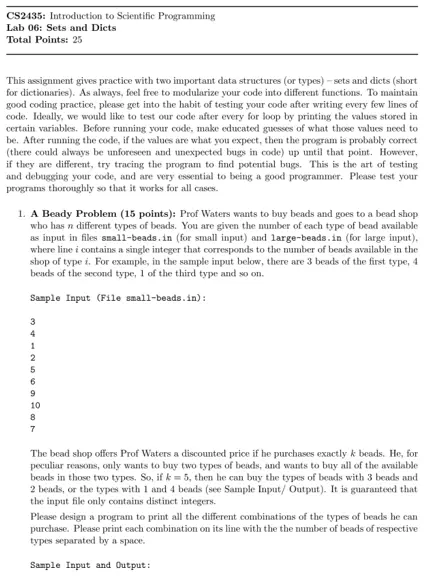Instructions
Objective
Write a python assignment program to implement sets and dictionaries.
Requirements and Specifications

Source Code
BEAD SUM LIST
if __name__ == '__main__':
filename = input('Enter input file: ')
f = open(filename, 'r')
l = []
for line in f.readlines():
l.append(int(line))
f.close()
k = int(input('Enter bead sum k: '))
t = []
for i in l:
if (k - i >= i) and (k - i in l):
t.append((i, k-i))
for pair in t:
print(pair[0], pair[1])
BEAD SUM SETS
if __name__ == '__main__':
filename = input('Enter input file: ')
f = open(filename, 'r')
l = set()
for line in f.readlines():
l.add(int(line))
f.close()
k = int(input('Enter bead sum k: '))
t = set()
for i in l:
if (k - i >= i) and (k - i in l):
t.add((i, k-i))
for pair in t:
print(pair[0], pair[1])
FREQUENCY COUNTS
if __name__ == '__main__':
filename = input('Enter input file: ')
f = open(filename, 'r')
word_dict = {}
letter_dict = {}
for word in f.read().splitlines():
if word not in word_dict:
word_dict[word] = 0
word_dict[word] += 1
for c in word:
if c not in letter_dict:
letter_dict[c] = 0
letter_dict[c] += 1
for word in word_dict:
print(word, word_dict[word])
print()
for c in letter_dict:
print(c, letter_dict[c])
Similar Samples
Explore our comprehensive programming samples at ProgrammingHomeworkHelp.com. From Java and Python projects to complex algorithms and web development, our examples showcase effective solutions across various domains. Each sample is crafted to illustrate problem-solving approaches, aiding students and professionals alike in mastering programming concepts and achieving academic success.
Python
Python
Python
Python
Python
Python
Python
Python
Python
Python
Python
Python
Python
Python
Python
Python
Python
Python
Python
Python
